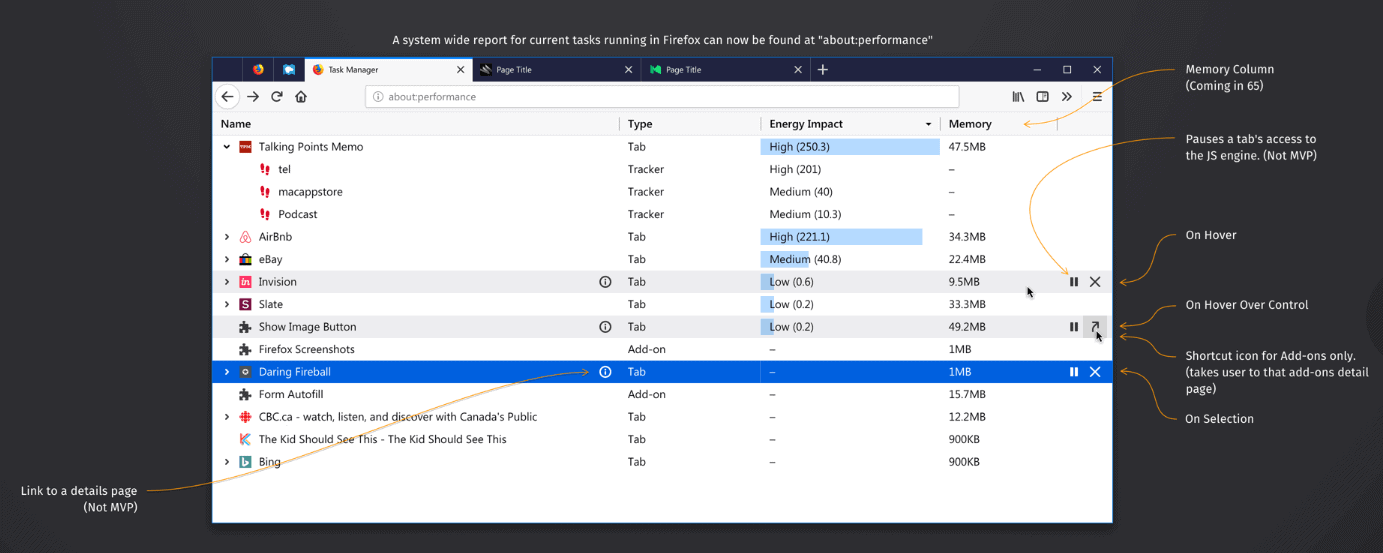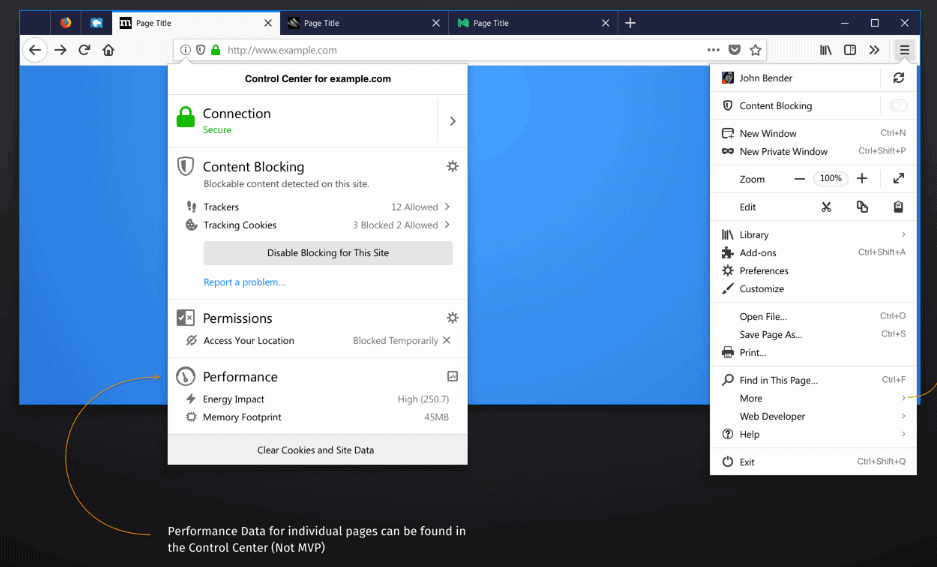This is Firefox's upcoming about:performance page (huge improvements)

The Firefox web browser will ship with a redesigned and improved about:performance page and related functionality soon.
Mozilla developers are currently working on the redesign and have enabled it partially in recent versions of Firefox Nightly, the browser's cutting edge development version.
The Nightly version sports a new design but limits the display to Energy impact information for the time being. While Firefox users find switches in about:config that turn features on or off in the user interface, none that add more data points to the performance listing seem to work at the time of writing.
Mozilla plans to add memory readings to the about:performance page in Firefox 65.
Tip: Find out what you can do if your browser uses too much memory.
Firefox improved about:performance
Mockups highlight how the finalized page and related user interface elements could look like.

The about:performance page lists performance information for tabs, identified tracker, and browser extensions. The energy impact and memory use is listed for each provided that the item uses resources.
Users may hover over items to activate direct actions,, e.g. to close a tab or open the add-ons details page. Tabs may get an i-icon next to them that users may click on to open a details page with additional information.
Performance data may also be added to a site's control center. Users need to click in the i-icon next to the site's address to display the control center for that site.

There they find information about the secure state of the connection, permission information, content blocking options, and soon maybe also performance information.
The performance information highlights a site's memory use and energy impact.
Closing Words
I like the Task Manager that Google implemented into its Chrome browser as it offers a quick way to find out about memory, CPU, or network-hungry pages or extensions, and do something about it right away.
Mozilla never implemented a Task Manager-like interface into Firefox; the closest is the about:performance page. The planned changes will make the about:performance page more useful to developers and Firefox users.
I'd love to see CPU and network information added to the performance metrics and options to display average values to get a clearer picture on an extension's or tab's resource usage (Facebook used 1.5 Gigabytes of memory on average in the last 48 hour period).
The option to react right away by hovering over a line on the about:performance page and activating one of the available actions is a welcome addition as well.
All in all, I'm looking forward to the change.
Now You: what is your take on the plans?






















The feature I’d love to see in about:performance is the *total* number of clock cycles used by the current URL in each tab. When Firefox shows 40+% usage in the system Task Manager but about:performance only shows a few % here and there by the time I launch it, the tab becomes kind of useless. Also, switching tabs may cause whatever was being a CPU hog to cease running. Being able to see which URL/tab/extension consumed the most clock cycles solves that problem. With a clock cycle count as a user, you can find CPU resource hogs much more easily. That would also be a neat performance metric for optimizing Javascript.
@Get Chrome,
Your opinion is the extreme of nonsense!
For example, if “attaching a tachometer or a telemetry system to a car”, will it become “imitation”?
Useful features, recognized the universal value, are those that will be shared.
The birth of Google Chrome is the diversion of WebKit developed by Apple.
Google Chrome is a copy of WebKit developed by Apple, has grown with the acquisition of other companies’ ideas and technologies.
What is truly worthwhile,
It is not “originality” but one in which “User First” has been pursued.
Regarding the market share by Browser, actual facts are unknown.
Most users do not use Browser by themselves, and use some (Edge, IE, Google, Firefox, etc.) in combination.
Among other things, because there are a lot of people who have a high degree of skill in the Firefox user, because it also carried out, such as opt-out of disguise and telemetry data of the user agent, the actual situation is unknown.
As an example,
“Tor Project” is limited to “Firefox ESR” from the viewpoint of fundamental security measures.
For journalists, corporations, military, etc., the use of “Google, Apple, Microsoft” which is impossible to control privacy is severely restricted and Tor Browser is routinely used.
By the way, back to the subject (Now You: what is your take on the plans?)
I agree with Martin’s “Closing Words”.
Thank you for your valuable topic (This is Firefox’s upcoming about:performance page) as usual.
Ohhh boy…yet another feature being copied by the dying Mozilla. Chrome did this first, back in 1997. This is another lame attempt to stay revelent to the hardcore crowd. Big fail, it wont help as Firefox’s userbase has been steadily decreasing by over 99.9% just this past week.
Well I welcome the changes Firefox is doing, but it doesn’t seem to help gain more users.
Ok, superb, but when toolbar api will be made?
More comments:
https://www.reddit.com/r/firefox/comments/9n8meu/this_is_firefoxs_upcoming_aboutperformance_page/
Information in about:performance should be available for extensions, themes, pages.
CPU usage, GPU usage, RAM memory used, GPU memory used, page opening time, in which content process (if default number of content processes then: 1, 2, 3 or 4) are examples of parameters which should be measured in about:performance. *Energy impact* is just not enough.
It should be possible to add, remove, move columns with particular measurements like in Process Explorer. It will be nice to close, suspend, change priority of page in the tab. (I am not sure if the number of parameters chosen for measurements can affect the amount of resources used by about:performance; if yes, then everybody will have choice about that by using only those essential; users should be warned about that – Task Manager and Process Explorer in Windows are using energy too).
It should be possible to reload all tabs from particular content process to minimize memory use (closing all tabs and content process and then reopening content process and tabs to lazy state or to the same state like before closing).
It will be great to be able to discard tabs in similar way like in chrome://discards/ in Chrome.
Minor suggestion about your English usage. You said:
“Mockups highlight how the finalized page and related user interface elements could look like.”
It’s either “how something could look”, or “what something could look like”. Note that you should only use “like” with the usage that starts with “what”. (There’s no reason for this – it’s just the way it is). Many non-native speakers of English make this mistake.
I love firefox but recently I am having a problem: whenever I download a file, even if on the window to select the save directory is shows the right name and extension, it get’s downloaded as “file” or “download” or “php”, with no file extensions…
since I download a lot of stuff I had to switch off to Opera… maybe next major version I will give another try to firefox.
Good news, thanks a lot for your article !
I wasn’ t even aware there was an about:performance page. That’s the problem with a program which has never relinquished its geeky origins (but keeps antagonising its power users — go figure). If there is a performance control tool, show it somewhere, for God’s sake !
That being said, yes, it looks like a welcome enhancement. Will there be a way to view the total memory footprint of Firefox ? This is impossible currently with Windows 7 Task Manager or Resource Monitor (unless I missed something).
By the way, Martin, nice little screenshot and commenting tool you’ve got there. Very beautiful arrows. Would you care to share its name ?
I don’t mind the various about: pages, since there is an index so you can find them. I have a real problem with about:preferences, though because there is no single place where you can find the possible settings and what they do.
Check https://www.ghacks.net/we-use/ ;)
> Will there be a way to view the total memory footprint of Firefox ?
about:memory is very useful if you’re interested in memory usage of Firefox.
> By the way, Martin, nice little screenshot and commenting tool you’ve got there. Very beautiful arrows. Would you care to share its name ?
The screens in the article are from Mozilla. They use InVision for their mockups.
Thanks. I’m lost among all those “abouts”…
about:about shows you a list :)
@ Marco & Reactor
I had forgotten about that, too… although I’m sure I learned about it on Ghacks. An “about:about” page : that sounds like a practical joke, but no, they did it…
What about (ha !) a menu item ? or an icon ? Terribly conventional, I know, but it works a treat…
url -> about:about -> bookmark -> not lost anymore
Maybe this is going to make it easier to find the tabs that have memory leaks.